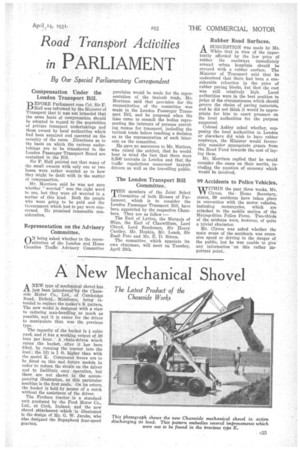Road Transport Activities
Page 47

If you've noticed an error in this article please click here to report it so we can fix it.
in PARLIAMENT
By Our Special Parliamentary Correspondent
Compensation Under the London Transport Bill.
BEFORE Parliament rose Col. Sir F. Hall was informed by the Minister of Transport that it wps not intended that the same basis of compensation should be adopted in regard to the acquisition of private transport undertakings and those owned by local authorities which had been acquired and operated on the security of the rates. Directions as to the basis on which the various undertakings are to be transferred to the London Passenger Transport Board are contained in the Bill.
Sir P. Hall pointed out that many of the small owners with only one or two buses were rather worried as to how they might be dealt with in the matter of compensation. Mr. Morrison said he was not sure whether " worried " was the right word to use, but they were all worried in a matter of this kind. Both the people who were going to be paid and the Government which had to pay were concerned. He promised reasonable consideration.
Representation on the Advisory Committee.
Ols7 being asked whether in the reconstitution of the London and Home Counties Traffic Advisory Committee
provision would be made for the representation of the taxicab trade, Mr. Morrison said that provision for the reconstitution of the committee was made in the London Passenger Transport Bill, and he proposed when the time came to consult the bodies representing the interests of persons providing means for transport, including the taxicab trade before reaching a decision as to the representation of such interests on the committee.
He gave an assurance to Mr. Matters, who raised the subject, that be would bear in mind the fact that there were 8,500 taxicabs in London and that the traffic regulations concerned taxicab drivers as well as the travelling public.
The London Transport Bill Committee.
THE members of the Joint Select Committee of both Houses of Parliament, which is to consider the London Passenger Transport Bill, have been appointed by the respective Chambers. They are as follow :—
The Earl of Lytton, the Marquis of Sligo, the Earl of Clanwilliam, Lord Clwyd, Lord Sanderson, Sir Henry Cantley, Mr. Hopkin, Mr. Leach, Sir Basil Peto and Mr. E. D. Simon.
The committee, which appoints its own chairman, will meet on Tuesday, April 28th.
Rubber Road Surfaces.
ASUGGESTION was made by Mr. White that in view of the opportunity afforded by the low price of rubber the roadways immediately around urban hospitals should be covered with a rubber surface. The Minister of Transport said that he understood that there had been a considerable retuction in the price of rubber paving blocks, but that the cost was still relatively high. Local authorities were in the best position to judge of the circumstances which should govern the choice of paving materials, and he did not think it would be appropriate for him to exert pressure dn the local authorities for the purpose suggested.
Colonel Ashley asked whether, supposing the local authorities in London or elsewhere did wish to have rubber roadways, the Minister would favourably consider appropriate grants from the Road Fund towards the cost of laying them.
Mr. Morrison replied that he would consider the cases on their merits, including the question of economy which would be involved.
99 Accidents to Police Vehicles.
WITHIN the past three weeks, Mr. Clynes, the Home Secretary, states, 99 accidents have taken place in connection with the motor vehicles, including motorcycles, which are attached to the mobile section of theMetropolitan Police Force. Two-thirds of the mishaps were, however, of quite a trivial character.
Mr. Clynes was asked whether the main cause of the accidents was excessive speed or driving to the danger of the public, but he was unable to give any information • on this rather important point.












































































































